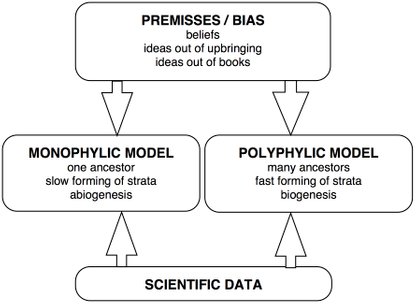KEPLER-SCIENCE
Origins
We come to the limits of science when studying the origin of the universe and of life. But we want to know where we come from. Quite a few people would like to know about origins without asking God. If He is there and created everything, He must know more than we ever can hope to find out.
Science is limited because it needs proof, it needs repeatable experiments. Quite a large part of the study into origins is historical science (see Exploring Science): we cannot redo a big bang and it is hard to know for sure whether processes we see now can explain the past.
In trying to make a model of how everything came into being, we will of course scientific data. But our premisses will play a role too: nobody works on a blank canvas when looking at the data. See the diagram to the right.
The fundamental problem
In science we do observations and experiments to support our theories - but the link isn't always st straightforward. Quite often the theory precedes the supporting observations or experiments, for instance in the case of the model of Copernicus and the theories on relativity of Einstein. A theory or model has to explain the known facts as well as possible – until another theory does a better job. Science is a human effort and scientific truth is at best temporary. For a supposed evolution another prothers added: we have to look back in time, which means that repeatable experiments are problematic and how do we measure time?
Modern science is partly due to the work of christian scientists, who did their research wholeheartedly while clinging to what God states in his Word.
They are convinced creation was done by the Word of God: ‘He spone and it was’ (Ps.33:9). What you see didn't originate from what you can observe (Hebr.11:3). The six days of creation can't be objects of normal scientific research - because they are so special and a once-only event. We can only observe the results of creation – not even completely because some species got extinct and a worldwide flood occurred.
How do scientist read the Bible?
It would be weird to suppose Gods Word speaks scientific language. If we read about ‘all kinds of birds’, have to ask the question what is meant. Among ‘birds’ we also find bats - which is logical if you know that in Hebrew it reads 'winged'. Rabbits and hares don't chew the cud in the same way as cows do: they don't ruminate. But they do produce two kinds of faeces: the green ones are immediately eaten again (we hardly ever see these), the brown ones are dropped outside. That can explain why in the Bible they're described as 'chewing the cud'.
Similar to this is the use of expressions as 'sunrise' and 'sunset': we even use these expressions while we 'know' that the Sun only seems to rise or set - due to the rotation of the Earth. Don't blame Joshua for saying "Sun, stand still" - God didn't blame him, because he acted as anyone would do - see also the page on Models of the Universe.
It seems the Bible is written in the (everyday) language of the onlooker. That doesn't make it unreliable or less true: it is revelation. But it isn't always easy to translate Biblical facts info science. If we read in Genesis about the Flood as a worldwide phenomenon, we should be able to find traces of this Flood in the strata. But how we should interpret the ‘fountains of the great deep’ and ‘the windows of heaven’? Which strata do and which don't belong to the Flood? We can try to translate the Biblical data into a scientific flood model - which will be open for debate and which has all the limits each scientific model has. This model will inevitably be less true than the Genesis account: all flood models are fallible works of men - with all errors you might expect of any model.
More on this topic can be found on the Bible on Origins page.
LINKS (on origins in general):
- Wikipedia on evolution and on creationism
- A creationists wiki
- The ICR website also provides a lot of information
- So does creation.com - with an archive of the magazine
- Article archives on Answers in Genesis
- All about Science also provides a lot of information
- About propulsion design
- Using this link you can download the separate chapters of: The Creation Answers Book
- Ian Juby has a lot of video material and links
- The website of the Creation Research Society
- You can also try some Dutch links
Mind you: be careful with all information you find - it can be flawed, outdated, biased, .... using different sources can help of course. And don't think creationists always agree on everything - just be open-minded and compare ...
Splash of Milk
If the solar system was brought about by an accidental collision, then the appearance of organic life on this planet was also an accident, and the whole evolution of Man was an accident too. If so, then all our present thoughts are mere accidents - the accidental by-product of the movement of atoms. And this holds for the thoughts of the materialists and astronomers as well as for anyone else’s. But if their thoughts - i.e., of Materialism and Astronomy - are merely accidental by-products, why should we believe them to be true? I see no reason for believing that one accident should be able to give me a correct account of all the other accidents. It’s like expecting that the accidental shape taken by the splash when you upset a milk-jug should give you a correct account of how the jug was made and why it was upset.
C.S. Lewis



